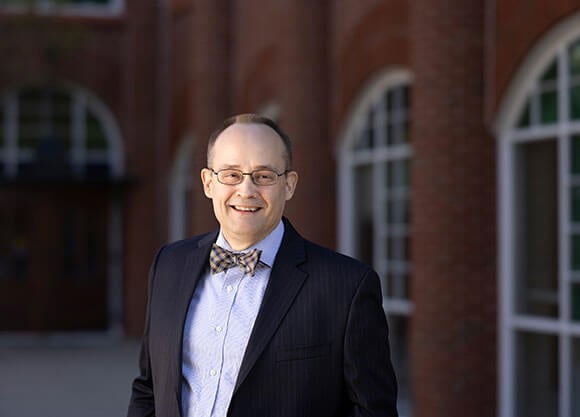
Engineering professor offers students a soundtrack for success
September 25, 2024

September 25, 2024

It helps Crawford develop a warm and welcoming classroom — and a rocking, if not often surprising, playlist.
Crawford, a professor of mechanical engineering and one of this year’s six recipients of a Center for Faculty and Staff Excellence award, looks forward to the songs that arrive in his inbox.
“I go through the list before every lesson and pick out one of the student songs and have it playing when they all come into class,” Crawford grinned. “It's been pretty interesting this semester. I've been exposed to some video game music that I wasn’t familiar with, but it's always fun to see the students' reactions.”
For the last 11 years, Crawford has engaged, educated and inspired students in the School of Computing and Engineering. He will be recognized with his fellow Center for Faculty and Staff Excellence honorees Oct. 22 at a special awards ceremony.
This isn’t the first time Crawford has been honored for his teaching.
In 2012, he received the American Society for Engineering Education National Outstanding Teaching Award. In 2020, he received the ASEE Ralph Coats Roe Award.
For Marcus Rocco Fratarcangeli ’24, who earned a Bachelor of Science in mechanical engineering, Crawford’s commitment to his students and his teaching changed everything.
When Fratarcangeli told Crawford that he wanted to become an astronaut, Crawford fully supported the idea and helped him develop a plan to realize his goal.
“Pursuing a PhD is something Professor Crawford helped convince me to do,” Fratarcangeli wrote in his Center for Faculty and Staff Excellence nomination letter. “Research is crucial for an astronaut applicant, and I was interested in graduate school.”
Today, Fratarcangeli is pursuing his PhD in mechanical engineering at Georgia Tech, the same institution where Crawford earned his graduate degree. Crawford later earned his PhD at the University of Kansas, after earning his bachelor’s degree at the United States Military Academy and serving as a distinguished officer in the U.S. Army.
Crawford credits Stephen Ressler, PhD, for encouraging him to teach and strive for excellence at West Point and beyond. Crawford also said he’s been surrounded by countless other excellent faculty mentors and peers, including Lynn Byers, PhD, the director of Quinnipiac’s mechanical engineering program.
Over the years, Crawford has learned — and taught his students — that innovation isn’t limited to engineering. It can be found everywhere, including classrooms.
Crawford is especially adept at pairing his lessons with contemporary examples. One of the lessons he’s teaching now pivots off the latest test flight of the SpaceX rocket Starship, the biggest rocket ever flown.
“I have students modeling the launch of this rocket,” Crawford said. “I try to make it fun and exciting for them. As they’re slugging through all the calculations, I like to bring some joy to the engineering.”
So Crawford created a class pool: The student who guesses the date closest to the next test launch wins a box of candy from 1963. In full disclosure, it’s new candy that was sold in 1963 such as Dots, Sugar Babies, bubble gum cigars and Necco wafers.
Over the years, Crawford has taught a catalog of engineering courses, including computer aided design, fluid mechanics, heat transfer, circuits, engineering design, statics, machine component design, aerodynamics and senior capstone courses.
For his circuits course during the pandemic, Crawford played the song “Synchronicity” by The Police to highlight three-phase electricity and synchronous instruction.
“The key to doing well at anything is having a genuine interest in really doing well in that area,” Crawford said. “It all starts there and drives your pursuit of excellence. It's become part of the culture in the engineering program here. It’s something that I am thankful for and don’t take for granted.”
Quinnipiac Today is your source for what's happening throughout #BobcatNation. Sign up for our weekly email newsletter to be among the first to know about news, events and members of our Bobcat family who are making a positive difference in our world.
Sign Up Now